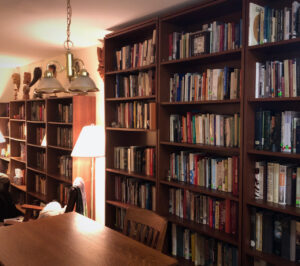
Photo by John Griswold
How many times in my life have I worked in that particular position: squatting or kneeling, one hand holding up a heavy piece of furniture or machinery, the other hand using a screwdriver, Allen key, or crescent wrench on it delicately? It is the trick of heavy and light labor at the same time: holding up drywall until it is nailed with no more than a dimple; finning in the water column until the prop is put on; cutting in paint along trim when the forearm and fingers have no fine motor control left. Any of hundreds of other awkward work positions, repeated for years, and still tamping down the anxiety that says, Put it down, stand up, let the knees and back be unburdened. With age the discomfort worsens but the will has more grit.
I had bought one of those cheap, heavy bookcases that ship flat in pallets and have to be assembled. There are no skills needed, but there is a lot of kneeling, lifting, screwdriving, and nailing. It feels like making your own coffin. My existing bookcases were triple-stacked in places, and with other clutter the living room had started to feel claustrophobic. I knew, though my son who was helping me did not, that one new case would not do it.
In the meantime, all the books had to come down for reordering, be dusted, and stacked on the floor. At some point there was little room left to walk, and my son, worried for me, asked if there was a fire would the place burn at 10,000 degrees? He was no happier when I found two more bookcases, well-used, on Facebook Marketplace and had to drive his old truck a fair distance to get them. The retired couple spoke no English, and the man insisted on screwing the parts of the shelves together to show me the system worked, then disassembling them, before we could load them in the truck.
It was late at night, and my son and I were tired, when I started trying out new placements of the bookcases around the room. My energy came from being an OG and it being my project. Also, I have been more tired, many times. My son was thinking of us having to drive that old truck 700 miles to get him back to school soon. That did not worry me so much. I had volunteered to be at the wheel, as I was long familiar with the noise, stink, and rough ride of an old vehicle, as well as the divine mystery of when it might decide quitting time had come.
The library of pain, discomfort, boredom, and fear built from past experience allows withdrawals when they are needed, to pull you through. In military dive school the cadre said that once we had survived some unpleasant thing in training, we would always know we had done that thing, so we could do it again if we had to. This has proved true in my life.
Children sometimes fear their parents’ knowledge, because they feel in their guts what it will take to acquire. They also worry their parents’ library of experience might be lost, like Alexandria, if the parents leave them unexpectedly. This is a burden for them, because they want what it offers more than anything else in life—confidence, self-knowledge, and judgement.
But all libraries, even those still under construction, show readers they are part of a larger world beyond everyday tasks. Enriched by its texts shared with others, we can feel encouraged to rise, survey the streets, and begin anew.
Having a solid wall of clean bookcases helped organize the rest of the task, and by the time my son got back from work the next day, all the books were on the shelves by genre, if not (yet) alphabetical order. The clutter was gone, and the floor vacuumed clean. Everything was foursquare and lovely, and both my sons, who had lost heart in the project separately, could hardly believe the order that had come from the chaos before it. The hope that this can happen when making plans is also to be found in the library of experience.
